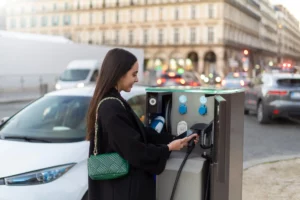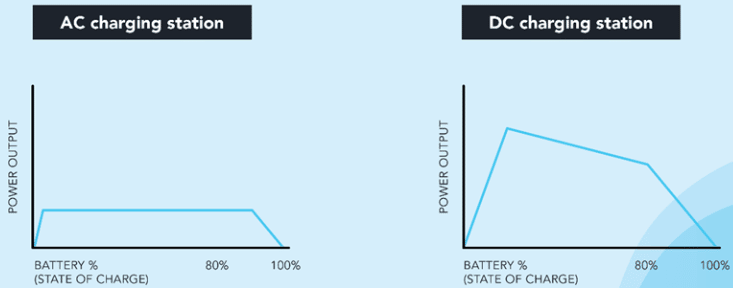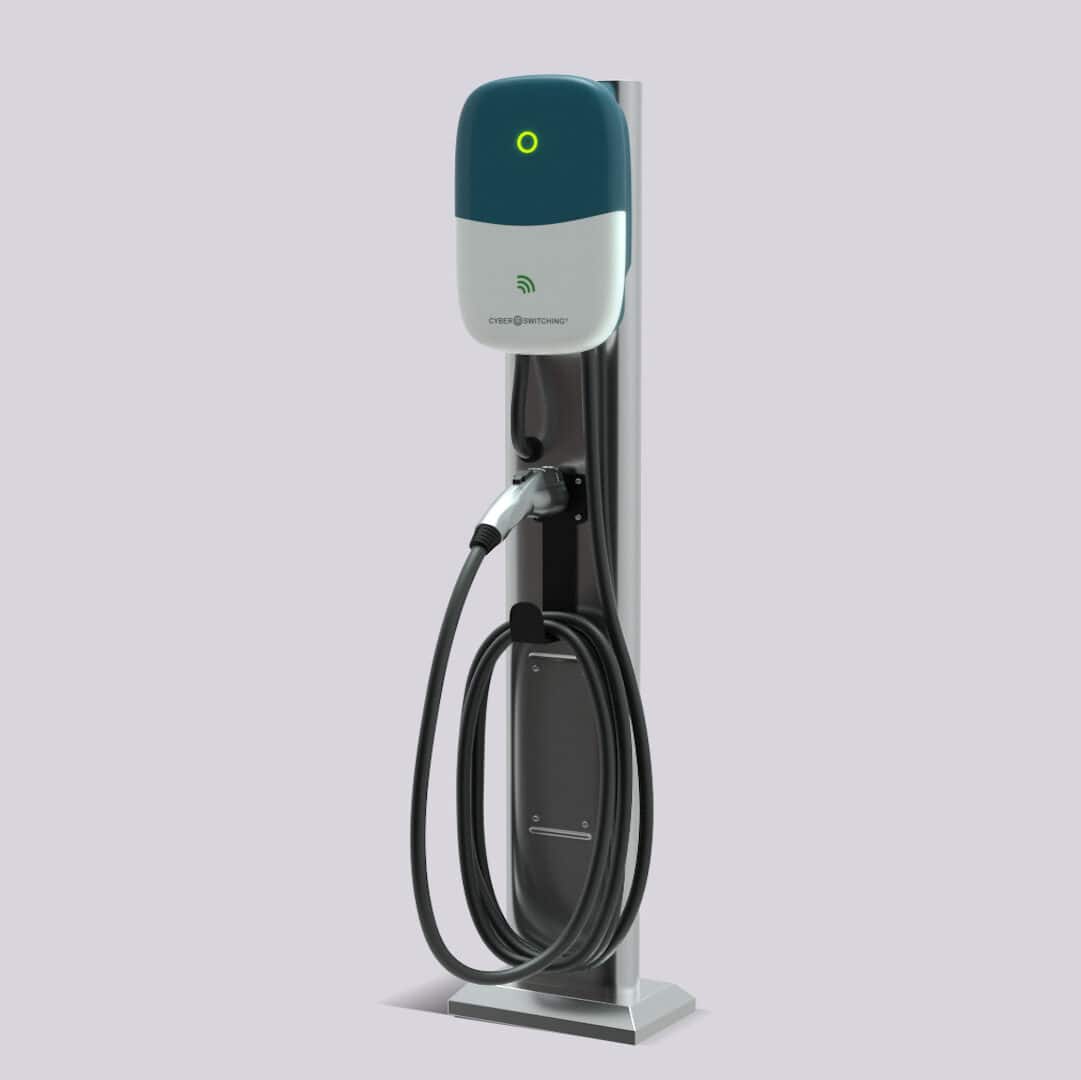
Home / EV Charging News / How Long Does it Take to Charge an Electric Car?
The number of Electric Vehicles (EVs) in the U.S. is estimated to reach 26.4 million registered EVs by 2030. This increasing popularity of EVs is why current and future EV drivers must be up to date with the latest and most detailed information on how EV charging works and factors that affect electric car charging duration.
This article delivers all this information in an easy-to-digest format, allowing you to comprehensively learn everything you need to know on the subject. Here we explain the main factors impacting electric car battery recharge time, and other factors that may affect charging time.

Figure 1: Charging curve for AC vs. DC charging – Source: EVBox
The average time required to recharge an electric car depends on the power rate of the charging station, the battery capacity of the EV, and the on-board charger installed in the car. Level 1 EV chargers take as long as 50 hours, Level 2 EV chargers take from 4 up to 10 hours, and the fastest electric car charging time considering a Level 3 charger may take from 1 hour up to a few minutes.
The following equation allows you to roughly estimate the charging time for practically any EV. You should use this equation in case you are using an EV charging station with a power rate equal to or lower than the on-board charge installed at the EV.
If the EV charging station delivers a higher power rate than the installed at your on-board charger, you should use the following modified equation:
Equations 1 & 2 deliver an excellent way to estimate charging time with a 90% accuracy, considering increasing and decreasing power rates at the beginning and end of the charging cycle. DC charging varies the power rate delivered to the EV, as seen in figure 1, which is why in real world conditions, charging time may be a little bit longer.
The recharge times for electric cars may be affected and limited by the following factors: Charging station, battery capacity, and EV charger capacity. Here we explain each one of them.
The power rate of EV charging stations is one of the main aspects affecting the electric car battery charge time. Charging stations are categorized by charging levels, according to the power delivered to the EV. Chargers may use AC or DC power, while they can also be classified into Level 1, Level 2, or Level 3 charging stations.
AC charging is performed with Level 1 and Level 2 EV charging stations. With a Level 1 EV charger featuring a 1kW power rate the time to fully charge an electric car is estimated at 40 to 50 hours. Using a level 2 EV charger with a power rate of 7kW up to 19kW, the average time to recharge an electric car is 4 to 10 hours.
Level 3 or DC Fast Charging (DCFC) stations directly inject DC power into the EV battery. This rapidly recharges the battery at a power rate of 50kW or up to 350kW. Fast charging time for electric cars is estimated at 20 minutes or up to 1 hour, depending on the power rate capacity of the DCFC station.
The EV battery capacity directly affects the average time it takes to charge an electric car since a high-capacity battery (more than 50kWh) will require more energy to get fully charged than a smaller one. The following list shows multiple battery sizes for the most popular EVs sold in the country:
A final aspect limiting the time required to charge the electric car battery is the maximum AC charging capacity for the installed EV on-board charger. DC charging is also limited to a maximum power rate. To summarize and consider all aspects, the following table illustrates the electric vehicle charging time for popular EVs in the market considering all three factors:
Estimated EV charging time
| EV | Battery (kWh) | Level 1 (1 kW) | Level 2 (7 kW) | Level 2 (Max AC) | Level 3 (Max DC) |
| Tesla Model Y | 75 | 75 hours | 10.5 hours | 6 hours & 49 minutes @ 11kW AC | 18 minutes @ 250kW DC |
| Tesla Model 3 | 57.5 | 57.5 hours | 8 hours | 5 hours & 13 minutes @ 11kW AC | 20 minutes @ 170kW DC |
| Ford Mustang Mach E | 70 | 70 hours | 10 hours | 6 hours & 21 minutes @ 11kW AC | 38 minutes @ 109kW DC |
| Chevrolet Bolt | 66 | 66 hours | 9.5 hours | 8 hours & 55 minutes @ 7.4kW AC | 1 hour & 19 minutes @ 50kW DC |
| Volkswagen ID.4 | 52 | 52 hours | 7.5 hours | 7 hours & 13 minutes @7.2kW AC | 26 minutes @ 118kW DC |
Aside from the charging station, battery capacity, and the on-board charger, other factors may affect the time it takes to charge an electric car. These are the following:
Not all EV drivers entirely drain the battery of their EVs before charging them back up again, some of them connect their EVs to a charging station even when there is a remaining percentage charge at the battery. This affects the charging time for an electric car because it will logically take more time to fully charge an EV battery from zero than it would take from a higher percentage state of battery.
Extreme temperatures (hot or cold) can deeply impact the time required to charge an electric car, since it reduces the charge accepted by the battery. Lithium-Ion batteries like the ones installed at EVs, charge better at temperatures of 32ºF (0ºC) up to 113ºF (45ºC). EV batteries charge at a much slower speed at below-freezing temperatures and they may charge at above 113ºF temperatures but this shortens their lifespan.
Even if the information above is detailed enough to explain the EV charging process and illustrate the time taken for charging an electric car, you might still have some doubts regarding some terms you may have heard. Here we aim to answer some those.
Rapid charging is Level 3 or DCFC. EVs are able to charge at a much higher power rate when Rapid Charging since the AC to DC conversion occurs at the charging station, and not at the on-board charger. The time required for charging an electric car with DCFC is extremely short, but constantly charging with DCFC reduces the lifespan of the battery by around 10%, this is why charging overnight with a Level 2 AC charger is the most recommended option.
Top up charging means charging an EV when there is still remaining charge in the battery. This is positive since it reduces charging times for electric vehicles. You may connect your EV even if it has only been discharged 30%, 50%, or another percentage and charge it back up to 100% by top up charging. This is a good practice since avoiding a high Depth of Discharge may extend the lifespan of your EV battery.
Charging your EV for an hour extends the range of your vehicle by a certain mileage. This depends directly on the efficiency of the EV and the power rate of the charging station. Considering the average charging time for electric cars and their efficiency, Level 1 EV chargers can add up to 5 miles per hour. Level 2 EV chargers can add up to 25 miles per hour, and DCFC may add from 100 up to 200 miles in just half an hour of charging.

CyberSwitching EV Charger on Pedestal
CyberSwitching Dual EV Charging Station
